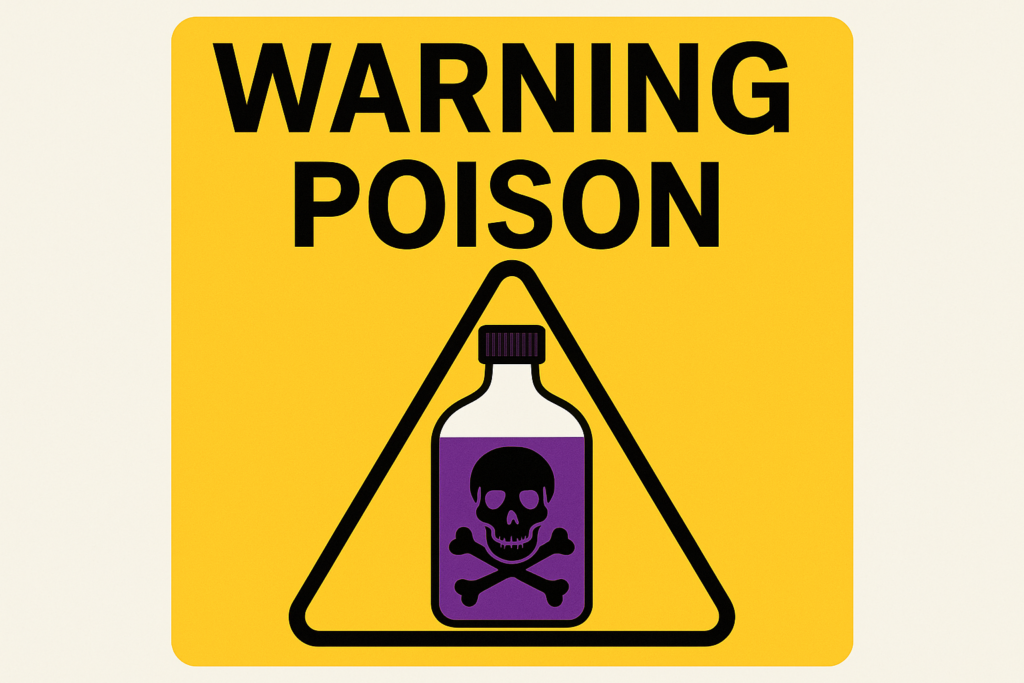Chemical Emergencies & Poisoning
Risk Concerns
Chemical emergencies and poisoning are serious concerns in the home, especially for older adults who may have impaired vision, memory, or mobility. Many everyday household items—such as cleaners, disinfectants, pesticides, air fresheners, and even personal care products—contain toxic substances that can cause harm if inhaled, ingested, or accidentally mixed. One of the most dangerous examples is mixing bleach with ammonia, which produces a toxic chloramine gas that can quickly overwhelm the lungs. Accidents often occur due to misreading labels, improper storage, or using products without adequate ventilation. In older adults, cognitive decline or limited physical ability may increase the risk of spills, incorrect usage, or failure to notice strong chemical fumes. Ensuring that labels are readable, products are clearly labeled and stored safely, and instructions are followed precisely is crucial in preventing such emergencies.

How to Limit & Risks Associated with Chemicals and Poisoning
- Stay away from the area if there’s a chemical emergency; move to a safe place immediately.
- Always follow instructions from local emergency personnel or public alerts.
- Wash off any chemicals from your skin using soap and water for at least 15 minutes.
- Remove all contaminated clothing immediately after exposure to harmful substances.
- If a chemical enters the eye, keep it open and rinse gently with water for 15 minutes.
- Use soap and water to clean the skin around the eye if any contact occurred nearby.
- If toxic fumes are inhaled, go outside or get to fresh air as quickly as possible.
- Do not breathe in further fumes — cover your mouth and nose if needed.
- Call the Poison Control Center at 1-800-222-1222 for immediate guidance.
Extra Precautions to Reduce the Risk of Chemical Exposure
- Read product labels carefully before using any cleaning or chemical products.
- Never mix bleach with ammonia or other cleaners — this produces toxic gas.
- Store chemicals securely and away from food or medications.
- Use large-print labels or color-coded stickers for older adults with vision issues.
- Keep cleaning products in original containers — avoid reusing bottles.
- Ensure good ventilation when cleaning — open windows or use exhaust fans.
- Wear gloves and protective eyewear when handling strong chemicals.
- Dispose of expired or unused chemicals properly — don’t pour them down the sink.
- Keep emergency contacts visible near phones and first aid kits.
- Avoid storing chemicals at low or unstable heights to prevent accidental spills or falls.
- Educate all household members — especially caregivers — about chemical hazards.
Frequently Asked Questions
1. What should I do if someone accidentally inhales cleaning fumes?
Get the person to fresh air immediately. Open windows and doors for ventilation. If they are coughing excessively, having trouble breathing, or feel dizzy, call 1-800-222-1222 or 911 right away.
2. Can I mix bleach with other cleaners to make them stronger?
No. Never mix bleach with ammonia, vinegar, or other cleaning products. It can create toxic gases that are dangerous and even deadly to breathe in.
3. What household items are common causes of chemical poisoning?
Common culprits include:
- Bleach
- Ammonia
- Toilet bowl cleaners
- Oven cleaners
- Disinfectants
- Drain openers
- Air fresheners
- Pesticides and insect sprays
- Nail polish remover and rubbing alcohol
4. How do I know if a product is poisonous?
Always check the label. Look for words like “Caution,” “Warning,” or “Danger” and read the usage and storage instructions. If it says “keep out of reach of children,” it’s also dangerous for adults if misused.
5. What are the signs of chemical poisoning?
- Trouble breathing
- Nausea or vomiting
- Dizziness or headache
- Burns on the skin or in the eyes
- Unusual behavior or confusion
- Strange odor on breath or clothing
6. Is it safe to store cleaning products under the kitchen or bathroom sink?
It’s best to avoid low storage, especially in homes with children or older adults who may reach or knock them over. Store them in a locked cabinet at chest height if possible.
7. What number do I call in case of poisoning?
Call the Poison Control Center: 1-800-222-1222 — it’s available 24/7 and free to use.
8. How can I make my home safer for an older adult?
- Use easy-to-read labels
- Avoid overstocking chemicals
- Use non-toxic alternatives whenever possible
- Keep products in their original containers
- Educate all caregivers on chemical safety
References & Helpful Articles
- https://www.fda.gov/drugs/bioterrorism-and-drug-preparedness/products-approved-chemical-emergencies
- https://www.cdc.gov/chemicalemergencies/shelter-in-place.html
- https://www.cdc.gov/chemicalemergencies/What-Should-do-in-a-Chemical-Emergency.html
- https://www.epa.gov/system/files/documents/2022-01/appendix-l-what-to-do-in-a-chemical-emergency.pdf
- https://epi.dph.ncdhhs.gov/oee/chemrad/chemfaq.html#j